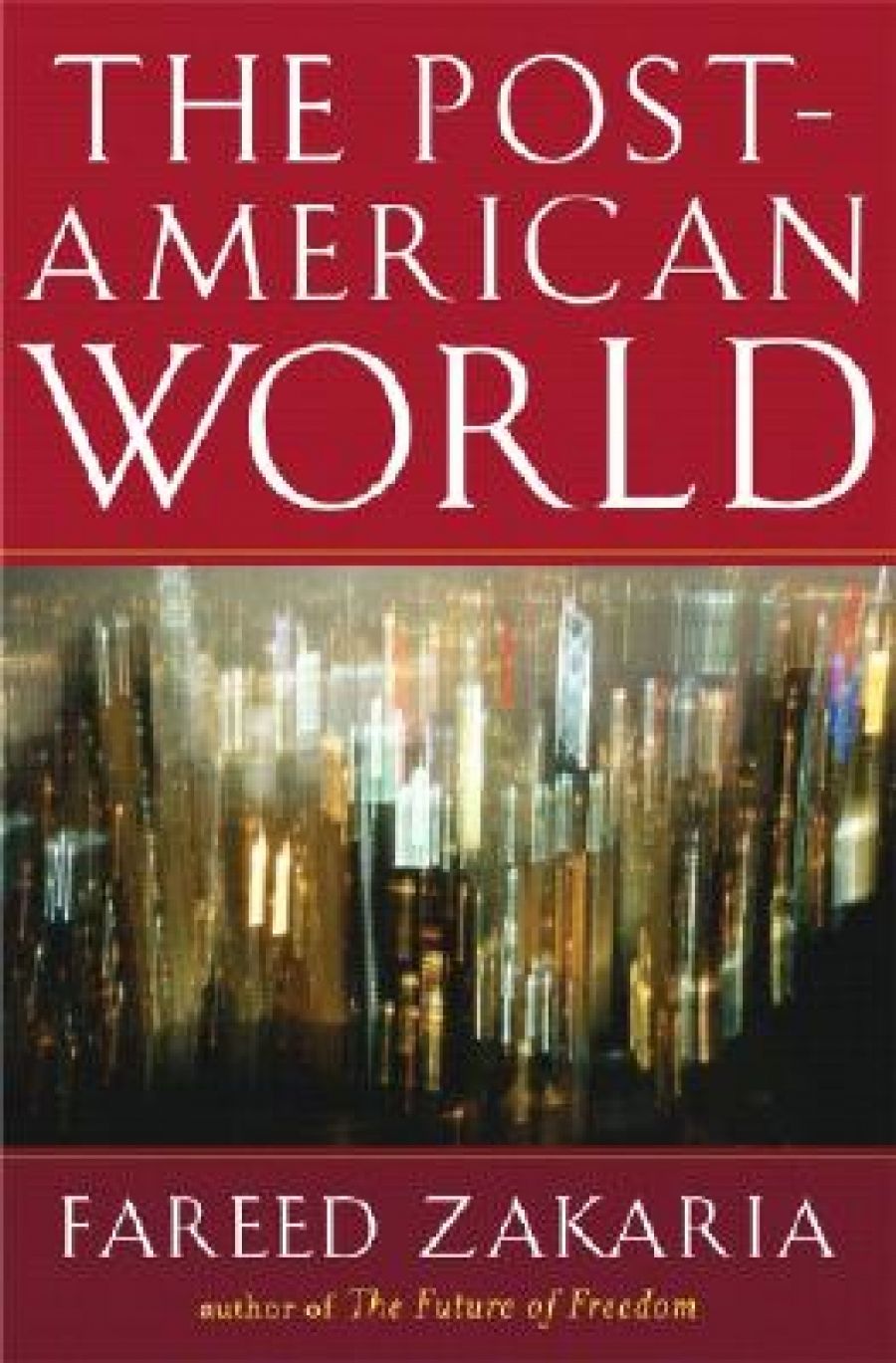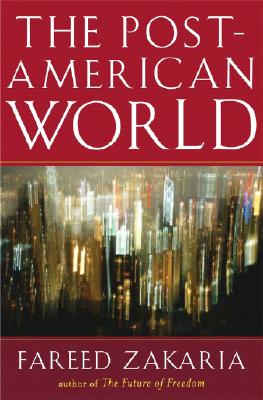
- Free Article: No
- Custom Article Title: Dazzled by bigness
- Review Article: Yes
- Article Title: Dazzled by bigness’
- Online Only: No
- Custom Highlight Text:
The author of The Post-American World, Fareed Zakaria, has a reputation that suggests the prototype for the twenty-first century Renaissance man. Zakaria was born in India, with Muslim roots but a secular upbringing. He was educated at a Christian school, then at Yale and Harvard. He studied international relations with two luminaries in the field, Samuel P. Huntington and Stanley Hoffmann. Add to this good looks, a facility with words and experience in journalism, and it is no wonder that it was he who succeeded in getting a serious foreign affairs show on to CNN
- Book 1 Title: The Post-American World
- Book 1 Biblio: Allen Lane, $34.95 pb, 292 pp
- Book 1 Cover Small (400 x 600):

- Book 1 Cover (800 x 1200):

Another gripe. Tucked away on page 272 is a warning from the author’s eight-year-old son about the dangers of setting out to tell the future: ‘If you’re wrong, people won’t buy the book anymore.’ The precariousness of prediction must already have been in Zakaria’s mind; much of this book is a selective – albeit entertaining and usually informative – investigation of the past. As an historian, I believe we should use the study of the past much more in international relations and public policy, but we have to do so with the historian’s craft and not that of the journalist on the hunt for a good anecdote to sell a story. Apart from being tendentious, there are dangers in this technique if you want to preserve the shelf life of a book.
Much of Zakaria’s analysis is influenced by the boom times in which he wrote. This is already dated because of the downturn caused by the credit crisis and rising oil prices. This is especially noticeable because the book is squarely based in the materialist world of economics and politics. It touches on culture, in its popular manifestation, but shows little interest in what we might call civilisation, the raison d’être for keeping the peace, preserving liberty and making money. Not even the environment rates much of a mention. That may be because Zakaria belongs to the ranks of what he, disparagingly, calls ‘policy wonks’. His peregrinations around the globe find him talking to élites about politics and economics. It is through this lens that Zakaria interprets the world.
Fortunately, this immersion in the discipline of international relations does not extend to the impenetrable use of IR-speak. On the contrary, Zakaria has the journalist’s penchant for explaining the complicated to the layman. For example, his footnote on gross domestic product and ‘purchasing power parity’ (the economic technique used to determine the relative value of currencies) takes the comparative price of a haircut to explain the differences between these two measures and when each is useful.
Thus, my complaints do not add up to a recommendation not to read this book. Rather, they are a warning that this is a polemic, about America’s present woes and about the place of China and India (not the rest of the world, as implied in the book’s opening line) in the twenty-first century.
Zakaria’s thesis is that the world is moving from anti-Americanism to post-Americanism. His caution, directed primarily at the United States, is that this means the old system in which the West – led in the last century by the United States – decided a plan (he cites Kyoto) intended for the Third World to adopt will no longer work. The West – read, the United States – must understand that new nations are asserting their identity.
This shift, he says, is more about power than it is about culture. This overstates the nature of today’s geopolitics, as Zakaria’s own fascinating discussion about modernity and its relationship to Western values suggests. Once, to be modern meant to be Western. This, however, is changing, partly because of power but also, as Zakaria concedes, because the rise of others comes with a different geographical perspective, one that has deep historical and cultural roots and that is likely to make the future modern less Western.
Revealing his impatience with the influence of the irrational on today’s politics, particularly in the United States under George W. Bush, Zakaria is alert to the pitfalls of democracy. This was the subject of an earlier book and remains a motif in this one. In The Future of Freedom (2003), Zakaria contended that the United States was suffering from an excess of democracy, which was threatening liberty. In The Post-American World, his (not unjustified) suspicion of populism and of superficial embraces of democracy – for example, the mere holding of elections – influences his assessment of the way new powers are developing and his concerns about the United States.
A substantial part of the book is devoted to discussing China and India, from a solidly American viewpoint. Zakaria dubs China ‘the challenger’ because ‘Americans are truly dazzled by bigness’, but also because he concludes that China has already won the race with India to become the next global power. India, he thinks, still has the chance to assume a dominant place in the world, if it can capitalise on its advantages: a growing economy and youthful population, attractive political democracy, secularism, knowledge of East and West, and a special relationship with the United States. To do so will mean a concerted effort to improve India’s governance.
Zakaria knows India, intuitively as well as intellectually. He and his research team have delved far and wide into China, with the result that the chapter is full of information and of contemporary as well as historical anecdote. It also contains serious analysis of the obstacles the challenger must face: in particular, spiralling decentralisation, the eventual transformation of the Communist Party’s power, and the demographic consequences of the one-child policy. But as the distinguished Asiaphile Ian Buruma has pointed out, Zakaria exaggerates the practical Chinese mindset and the Party’s abandonment of ideology, revealing that he has yet to penetrate the inscrutability of the Chinese.
One ‘ism’ that prevails in China is nationalism, made obvious by sporadic popular outbursts of hostility towards Japan and Taiwan. These are a reminder that China’s stated policy of harmonious growth and integration into the global economy is backed by its capacity for military confrontation. Nevertheless, Zakaria thinks the bigger challenge is posed by a Chinese policy of patient non-confrontation, which edges the United States onto the side-lines of Asia.
The final part of the book considers how the United States can cope with decline. Despite his earlier contention that the problem is the rise of the rest of the world, not the fall of the United States, Zakaria compares the end of the British Empire with that of the United States today. Both ‘empires’ were, in their heyday, the only true global players. The cause of British decline after World War I was economic. For the United States, he says, it is political. Zakaria believes that the adventurous, innovative spirit of the United States can restore its economic fortunes – if the system lets it. Right now that system has lost its ability for compromise, and to accept short-term pain for longer-term gain. Politics has become a debate about trivia, dominated by partisan battles, not problem-solving.
Secondly, America has become fearful. To adapt to a world in which others have moved up, it must reclaim the confidence it lost on 9/11. In addition, it must do what others have been doing, thanks to American leadership, but which it forgot to do itself – the United States must globalise itself and learn how to move into other people’s worlds as they learned in the twentieth century to adapt to American power.
Zakaria’s solution is that of the international relations expert. It is a six-point guide to operating in a new world, one that accommodates existing international structures and new voices within them. For the United States this includes abandoning the idea that it needs to be involved everywhere and to learn to compromise. Even harder, it will have to adhere to the international rules just like everyone else and to engage with all the great powers, not just those who appear to follow the American line. In short, the United States must restore its legitimacy if it is to thrive in the post-American world.


Comments powered by CComment